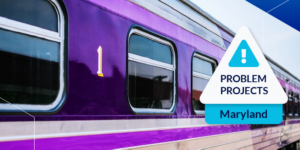
After years of delays and a long pause after its initial GC left the project, Maryland’s Purple Line rail project has a new contract with a new construction team, meaning the project can finally resume.
The new contract added $1.46 billion in construction costs for the Purple Line, making the contract’s total $3.4 billion — nearly 75% more than the project’s initial budget of $1.97 billion.
The project has a unique funding situation, and one aspect of note is the involvement of a private consortium — Purple Line Transit Partners — which will be managing the project for the state of Maryland and helping finance construction, as well as future operation and maintenance.
The consortium signed the contract with joint venture Maryland Transit Solutions, which consists of Dragados USA and OHL USA, American subsidiaries of major Spanish contractors.
Even though significant work had already been done for the project, the selection of the new joint venture was necessitated by the departure of the original project general contractor — Fluor — in the fall of 2020, leaving the project in limbo.
The Texas-based company left the project after it said that the project was two-and-a-half years behind schedule and $800 million over budget following numerous administrative and design problems.
That lead to a payment dispute, which eventually resulted in the Maryland Department of Transportation paying Fluor $250 million. Reports noted that around $1.1 billion of work had been completed before Fluor quit.
MDOT spokeswoman Erin Henson noted that Dragados and OHL were chosen after the state “received strong recommendations” on the two GCs, based on their “approach, partnership and ability to deliver transportation projects for the community.”
However, the companies haven’t been without their own controversies in recent years, either.
Dragados has been under particularly heavy scrutiny after the company was caught up in significant delays on public transportation projects in Washington State, North Carolina, and Texas — with some of the company’s projects stretching more than two years behind schedule.
Other transit projects have also caused some major headaches for contractors during the COVID-19 pandemic, which has seen high-speed rail projects in California and Florida come up against major delays during their planning stages.
However, even with the high-risk possibility attached to such projects, there’s a high-reward aspect clearly present. Major cities around the country such as New York, Los Angeles, and Las Vegas have been looking to expand their public transit capabilities in recent months, and President Biden’s focus on infrastructure spending has billions of dollars allocated towards transit buildup in the coming years.

